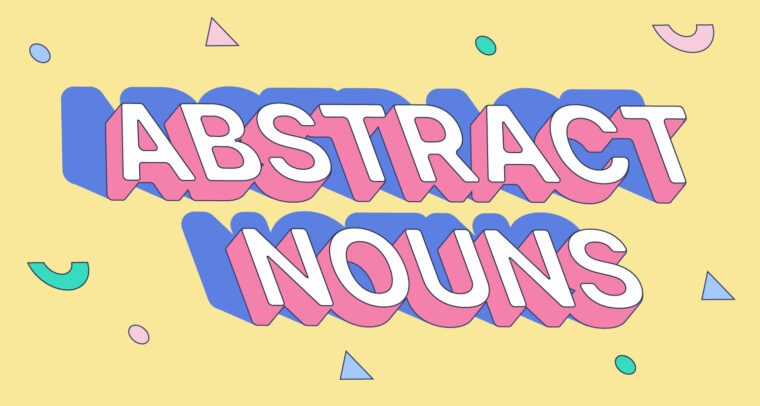
Abstract nouns represent intangible ideas—things you can’t perceive with the five main senses. Words like love, time, beauty, and science are all abstract nouns because you can’t touch them or see them.
Without a tangible frame of reference, abstract nouns can be hard to pin down with grammar rules. In this quick guide, we explain the basics so you can use abstract nouns with confidence!
What are abstract nouns?
Nouns in general represent things (including people, places, objects, and ideas). But some things aren’t actually things! Ideas, emotions, personality traits, and philosophical concepts don’t exist in the physical world—you can’t sense them or interact with them—so we call them abstract nouns to differentiate them from concrete nouns.
Abstract nouns vs. concrete nouns
We dive deep into abstract nouns vs. concrete nouns here, but there’s a quick and easy way to tell them apart. If you can see, hear, taste, smell, or touch it, then it’s a concrete noun. If you can’t, then it’s an abstract noun.
Consider the difference between anger, an abstract noun, and chair, a concrete noun. You can touch a chair and see a chair, but you can’t touch or see anger itself. (Even though you can use your five senses to perceive the signs of anger, such as seeing a red face or hearing a gruff tone.)
By default, proper nouns are never abstract nouns. Proper nouns like the Empire State Building, Kathmandu, or Mister Rogers represent things that are specific and tangible. However, this can get confusing if a philosophical idea is derived from a proper noun. For example, Karl Marx is a proper noun, but Marxism is an abstract noun, even though it’s still capitalized.
Examples of abstract nouns
As we’ve said, abstract nouns can be hard to describe because they elude the senses. Sometimes it’s better to see examples to understand. (Some of these can also double as verbs, especially the emotions, so pay attention to how they’re used in the sentence.)
Ideas
- life
- death
- humor
- independence
- communication
- information
- honor
- trust
- pain
- pleasure
Emotions
- love
- hatred
- happiness
- sadness
- fear
- anguish
- ecstasy
Personality traits
- courage
- loyalty
- compassion
- maturity
- elegance
- stupidity
- aggression
- patience
Philosophical concepts
- industrialism
- causality
- relativity
- ethics
- capitalism
- democracy
Of course, there are thousands of other abstract nouns, but these are just some common ones to help you understand.
Forming abstract nouns with suffixes
Often you can create abstract nouns from verbs, adjectives, and even concrete nouns by taking the root word and adding a suffix. This is a great way to discuss the general concept behind something besides specific examples.
Take the verb relax. To describe the general state of relaxing, add the suffix -ation to make the abstract noun relaxation. The adjective good takes the suffix -ness to become the abstract noun goodness. The concrete noun friend needs -ship to make the abstract noun friendship.
Specific words use specific suffixes, so you can’t just mix and match them at will. Consult a dictionary if you’re not sure on the correct suffix. Be careful: Some words change completely when they become abstract nouns. The abstract noun of weak is weakness, but the abstract noun of strong is strength.
Using abstract nouns in a sentence
Abstract nouns follow all the same rules as other nouns. They work perfectly well as subjects and objects, follow capitalization rules as usual, and can take a possessive form (e.g., freedom’s price). They can also be singular or plural; however, you first must identify whether they’re countable or uncountable (also known as mass nouns).
Countable and uncountable abstract nouns
One of the hardest parts about abstract nouns is determining whether they are countable or uncountable—often they can be both, but only one is correct depending on the usage.
Basically, if an abstract noun has a general or broad meaning, representing all occurrences, it is uncountable.
Time flies when you’re having fun.
No one wins without talent.
“Success is not final; failure is not fatal.” —Winston Churchill
If, however, an abstract noun refers to a specific incident or occurrence, then it follows the rules of a countable noun, using articles (a, an, the) and quantifiers like few and many. If your specific abstract noun refers to more than one occurrence, you make it plural by following the regular rules for nouns.
The time I spend with you lasts forever.
You have a talent for winning.
“If a book about failures doesn’t sell, is it a success?” —Jerry Seinfeld
When to use abstract nouns—and when not to
Abstract nouns are perfectly at home in philosophical, existential, and ideological conversations—it’s hard to discuss these matters without them. Likewise, discussions about emotions and feelings usually contain abstract nouns, especially when feelings are ongoing or constant.
The trouble with abstract nouns, though, is that they tend to be vague. Because we can’t perceive them physically, everyone has their own idea about what they are. Just as “beauty is in the eye of the beholder,” the word beauty is interpreted differently by each “beholder.”
For this reason, good writing often involves concrete examples sprinkled in with your abstract nouns to anchor the discussion in reality. Concrete examples illustrate our points and encourage readers to see things our way, rather than their own way by default. For example, if you were writing an essay about the importance of choosing a career (abstract noun), you’d do well to mention specific careers like doctor, mechanic, or proofreader (concrete nouns).
Abstract nouns and their rules can be a lot to absorb. Hopefully with our guide, you have a firmer understanding—and are on your way to writing about them with ease.





